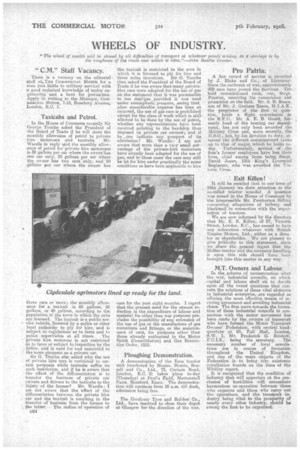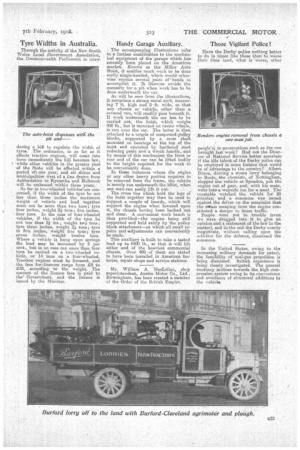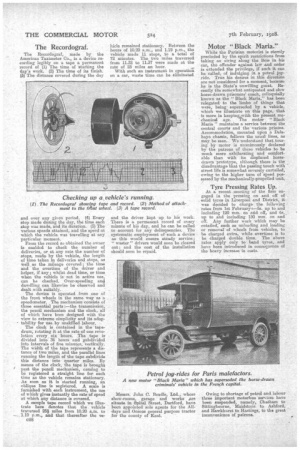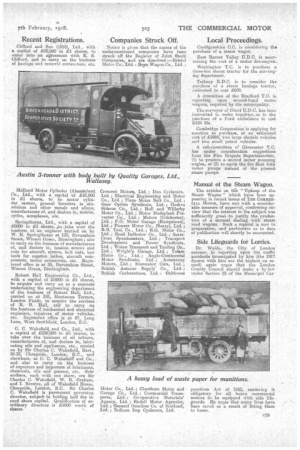WHEELS OF INDUSTRY.
Page 4

Page 5

Page 6

Page 7

If you've noticed an error in this article please click here to report it so we can fix it.
"The wheel of wealth will be slowed lv all difficulties of transport at whatever points arising, as tt carriage is by the roughness of the roads over which it riins."—tIohn. Beattie Crozier.
" C.M." Staff Vacancy.
• There is a vacancy on the editorial stall of TILE COMMERCIAL MOTOR for a. Man (not liable to military service) witk a good teelinical knowledge of motor engineering and a bent for journalism. Apply in writing to the Manager, COMMERCIAL MOTOR, 7-15, Rosebery Avenue, London, E.O. 1.
Taxicabs and Petrol.
• In the House of Commons recently Sir George Touche asked the President of 'the Board of Trade if he will state the monthly: allowance of petrol to private . hire Motel-cars and taxicabs. Mr. Wardle in reply said the monthly allowance of petrol fer private hire motorcars is 30 gallons per car where the owner has one car only, 25 gallons per car where theowner has two cars only,. and 20 gallons' per ear where the owner has three cars or more; the monthly allowance for a' taxicab is 00 gallons, 50 gallons, or 40 gallons, according to tire' • pepulation of the town in which the cabs are licensed. The taxicab is a, public service vehicle, licensed by a police or other local AUthority to ply for hire; and is
• subject to regulations as to fares and to police supervision at sill times. The private hire. motorcar is not restricted as to fares or subject to inspection by the . Police, and is used for 'and restricted to tie 'sameptirpeses as a private car. Sir G. Touche also asked why the use of private hire cars i5 restricted to certain purposes while taxicabs stiffer no such restriction, and if he is aware that the effect ofthe differentiation is to transfer the businees of private car otiiners and drivers to the taxicabs to the injury of the former? Mr. Wardle: I am not aware that the effect of the differentiation between the private hire ear and the taxicab is resulting in the transfer of business from the former to the latter, -The radius -of -operation-of
the taxicab is restricted to the area in which it is lieensed to ply for. hire and
three miles therefrom. Sir G. Totiehe then asked the President of the Board of Trade if he was aware that many private. hire cars were adapted for the use of gas on the statement that it was permissible to use coal-gas provided it was used under atmospheric pressure, seeing that. after considerable expense has been se incurred, the use of gas cars is prohibited except for the class of work which is still allowed to be done by the use of petrels whether any representations have been received pointing to the hardship thus inTosed on private car owner; and if he . can indicate any prospect of its alleviation? Mr. Ward?e.: I am not aware that more than a very small percentage of the private-hire motorcars have already been adapted for the use of gas, and in those eases the cars may still be let for hire under practically the same conditions as have been a.pplica-ble to hire
rasa for the past eight month.% I regret that the present need for the utmost redaction in the expenditure of labour and material for other than war purposes precludes the possibility of any extension of the use of gas Or the manufacture of gas containers and fittings, or the maintenance of cars, for purposes other than those already authorised in the Motor Spirit (Consolidation) and Gas Restriction Order, 1018.
Ploughing Demonstration.
A demonstration of the Eros tractor unit (marketed by Messrs. Morris, Russell and Co., Ltd., 75, Curtain Road,
London, E.C. 2) takes 'plaee to-day(Thursday) at Paul's Field, Mertonstall
Farm, Romford, Essex. The demonstration will continue from 10 a.m. till dusk, admission being free.
The Goodyear Tyre and Rubber Co., Ltd. have resolved to-close their depot atGlasgow for the duration of the war.
Pro Patria:
A fine record of service is recorded by J. Blake and Co., • of Liverpool. Since the outbreak of war, approximately 400 men have joined the Services. Ten. hold tonunissioned rank, .one, Sergt. Preston, receiving his commission and promotion on the field. Mr. S. B. Roses, son of Mr. J. Graham Reece, the proprietor of the 0rrn iii question, holds a flight commission.. in the R.F.C. Mr. A. E. B. Gould, formerly head of the touring car department, has not only been awarded She Military Cross and, more recently, the D.S.O.' but, by his Klevotiop to day, attained the different commissioned ranks up to that of major, which he holds today. Unfortunately, several of the firm's former employees, have lost their Lives, chief among them. being Sergt. David Jones, 12th King's Liverpool Regiment, who was awarded the Victoria Cross-.
Exit Killen!
It will be recalled that in our issue of 24th January we drew attention. to the so-called tractor scandal. A' question was raised in the House of Cornmons by the irrepressible Mr. Pemberton Billing concerning allegations of bribery and blackmail in connection with the importation of tractors.
We are now informed by the directors that Mr. E. B. Killen, of 27, Victoria Street, London, E.G. has ceased to have any connection • whatever with British Empire Motors, Ltd., either as a clireeter or shareholder. We are pleased to give publicity to this statement, .since we share the general regret that the Moline tractor and the company handling it upon this side should have beee brought into this matter in any way.
M.T. Owners and Labour.
In the scheme of reconstruction -after the war, industrial councils, on which . capital and labour shall sit to decide upon all the vexed questions that concern the relations of those vital eleinente in industrial enterprise, are regarded as offering the most effective means of securing agreement and avoiding industrial chaos. The first ITIOVA towards the formation of these industrial esotinciia in connection with the motor movement has been made by the owners of transport who have forined the. Motor Transport Owners' Federation; with central headquarters at 83, Pall Mall, London, S.W. 1, Mr. Frederick G. Bristow, F.C.I.S., being the secretary. The necessary number of local associations are in course of formation throughout the United Kingdom, and one of the main objects of the Federation is to bring into existence conciliation boards on the lines of the
Whitley report. • It is recognized that the condition of industry that will appertain at the conclusion of hostilities will necessitate harmonious co-operation between :those tvho organize and those who carry out the operations, and the transport industry being vital to the prosperity of nearly every other industry, shoUld. be iimeng the first to be organized.
Tyre Widths in Australia.
Through the activity of the New South Wales Local ,Government Association, the Commonwealth Parliament is intro clueing a bill to regulate the width of tyres. The ordinance, in so far as it affects traction engines, will come into force immediately the bill becomes law, s while other vehicles in the greater ;Sart of the State will be affected within a period of one year, and all shires and municipalities west of a line drawn from Ashfardshire• to Kycarnba and Holbrook will be embraced within three years.
So far as two-wheeled vehieles'are concerned, if the width of the tyre be not less than three inches the maximum weight of vehicle and load together must not be more than two tons; tyre four inches, weight 2i tons; five inches, four tons. In the case of four-wheeled vehicles, if the width of the tyre be not less than 2i ins., weight two tons; tyre three inches, weight 4. tons; tyre to five inches, weight five tons; tyre seven inches, weight twelve tons. Where a vehicle is hung upon springs the load may be increased by 6 per cent., but in no case can more than four tons be carried on a two-wheeled ve, hide, or 14 tons on a. four-wheeled. Traction engines must be licensed, and the fees for &licences range from £5, to ,R35, according to the weight. The amount of the licence fees is paid to thee Govermbent, and the licence is issued by the Minister.
Handy Garage Auxiliary.
The accompanying illustrations refer to a further contribution to the mechanical equipment of the garage, which has recently been placed on the American market. Known as the Miller Auto Hoist, it enables much weik to be done easily single-handed, which woold 'otherwise require several pairs of hand to accomplish it. It likewise avoids the necessity for a pit when work has to be dons underneath the car.
As will be seen from the illustrations, it comprises a strong metal arch, measuring 7 ft. high and 8.-ft. wide, so that any chassis or vehicle, other than a covered van, will readily pass beneath it. If work underneath the car has to be carried out, the hoist, which weighs 400 lb., but is mounted on castor wheels, is run over the car. The latter is then attached to a couple of compoundlpulley blocks supported by a cross shaft mounted on bearings at the top of the hoist and operated by hardened steel reducing gears and a winch handle, and by means of this mechanism the front or rear end of the car can be lifted bodily to the height required for the work to be conveniently done.
In those instances where the engine or any other heavy portion requires to be removed from the frame, the vehicle is merely run underneath the Mist, when one man; oan easily, lift it out.
The cross ties which hold the legs of the hoist together may then be used to support a couple of boards, which will support the engine when lowered upon it, the chassis having been backed out and clear. A convenient work bench is thus provided—theengine being still supported and held safely by -the pulley block attachment—on which all small repairs and so,djustments can conveniently be made.'
This auxiliary is built to take a tested load up to 6500 lb., so that it will lift either .end of the heaviest commercial chassis. Over 400 of them are stated to have been installed in American factories, repair shops and service stations.
Mr. William A. Mad/Can, shop superintendent, Austin Motor Co., Ltd., Birmingham, has been created a member of the Order of the British Empire. Have the Derby police nothing better to do in times like these than to ,waste heir time (and, what is worse, other
people's) in prosecutions such as the one brought last week.? Had not the Direc. tor of National Service better ascertain if the idle talent of the Derby police can be employed in some fashion that would be of advantage to the country? Albert Dixon, driving a steam lorry belonging to Boots, the chemists, of Nottingham, stopped the vehicle at Sponden, put the engine out of gear, and, with his mate, went into a wayside inn for a meal. The constablewatched, the vehicle for 20 dm inutes, -and -a summons was issued against the driver on the complaint that the stea.m escaping. from the engine constituted a danger to horse traffic.
People were put to trouble (even we were dragged into it to give an opinion and a statement of the law in the matter), and in the end the Derlay county magistrate, without calling upon the solicitor for the defence, dismissed the summons.
In the United States, owing to the increasing military demands for petrol, the feasibility of coal-gas propulsion is being dismissed. British experience is being closely, investigated. The general tendency inclines towards the high compression system owing to its convenience and avoidance of structural additions to the vehicle.
The Recordograf, made by the American Taximeter Co., is a device recording legibly on a tape a permanent record of (1) The time of starting the day's work. (2) The time of its finish. (3) The distance covered during the day and over any given period. (4) Every stop made during the day, the time each stop was made, and its duration. (5) The various speeds attained, and the speed at which the vehicle was travelling at any particular moment. From the record Cu obtained the owner is enabled to check the number of deliveries, or at any rate the number of stops, made by the vehicle, the length of time taken in deliveries and stops, as well as the mileage covered; the time and the overtime of the driver and helper, if any ; whilst dead time, or time when the vehicle is not in active use, can be checked. Over-speeding and dawdling can likewise be observed and dealt with suitably. The device is operated from one of the front wheels in the same way as a speedometer. The mechanism consists of three essential parts :—the transmission, the pencil mechanism and the clock, all of which have been designed with the view to extreme simplicity and its adaptability for inse by unskilled labour.
The clock is contained in the tapedrum, rotating it at the rate of one revolution every six hours. The tape is divided into 36 hours and pubdivided into intervals of five minutes, vertically. The width of the tape represents a distance of two miles, and the parallel lines running the length of the tape subdivide this distance into quarter miles. By means of the clock, the tape is brought past the pencil mechanism, causing to be registered a straight line for such time as the vehicle remains stationary. As soon as it is started running, an oblique line is vegistered. A scale is furnished with each instrument, the use of which gives instantly the rate of speed
i at which any distance s covered.
A sample tape record which we Miletrate here denotes that the vehicle traversed 253miles from 10.20 a.m. to 1.19 p.m., and that thereafter the ye
hide remained stationary. Between the hours of 10.20 a.m., and 1.19 p.m., the vehicle made 11 stops, to a total of 72 minutes. The two miles traversed from 11.32 to 11.37 were made at the rate of 25 miles an hour.
With such an instrument in operation on a car, waste time can be eliminated and the driver kept up to his work. There is a permanent record of every minute of his day, and he can be called to account for any delinquencies. The systematic employment of such a device as this would ensure steady service; " waster " drivers would soon be cleared out ; and the cost of the installation should soon be repaid.
Messrs. John a Beadle, Ltd., whose show-rooms, garage and works Are situate in Spital Street, Dartford, have been appointed sole agents for the Alidays and Onions general purpose tractor for the county of Kent. 7th February, ibis. Motor "Black Maria."
While the Parisian motorist is sternly precluded by the spirit restrictions from taking an airing along the Bois in his car, the offender against law and order is extended the privilege, if such it can be called, of indulging in a petrol joyride. True his desires in this direction are not considered for a moment, because he is the State's unwilling guest. Recently the somewhat antiquated and slow horse-drawn prisoners' coach, colloquially known as the "Black Maria," has been. relegated to the limbo of things that were, being superseded b_y a vehicle, which we illustrate on this page, that is more in keeping,rith the present me" chanical age. The motor "Black Maria" maintains a service between the central courts and the various prisons. Accommodation, mounted upon a Delahayo chassis, follows the uSual lines, as may be seen. We understand that tour, ing by motor is unanimously declared by the patrons of these vehicles to be much more exhilarating and comfortable than with its displaced horsedrawn 'prototype, although there is the disadvantage that the passing touch with i street life s somewhat severely curtailed, owing to the higher turn of speed possessed by the mechanically-propelled unit.
Tyre Pressing Rates Up.
At a recent meeting of the firm engaged in the pressing on and off of • solid tyres in Liverpool and District, itwas decided to charge the following rates from 1st February-5s. up to and including 120 mm on and off, and 6s.. up to and including 180 mm. on and off. Any further work which may be entailed, such as unloading and leading or removal of wheels from vehicles, to be charged extra, while overtime is to be charged double time. The above rates apply only to band tyres, and have been introduced in consequence of the heavy increase in costs.
Owing to shortage of petrol and labour three important motorbus services have been suspended, namely, Chatham to Sittingbourne, Maidstone to Ashford, and Hawkhurst to Hastings, to the great inconvenience of patrons.
Recent Registrations.
Clifford and Son (1918), Ltd., with a capital of £10,000 in £1 shares, to enter into an aereement with E. S. Clifford, and to carry on the business of haulage and removal contractors. etc.
Midland Motor Cylinder (Aluminium) Co., Ltd., with a capital .of £10,000 in £1 shares, to' be motor cylinder casters, general founders in aluminium and other metals and alloys, manufacturers of, and dealers in, motors, cycles, aeroplanes, etc.
Springthorpe, Ltd., with a capital of £2000 in £1 shares, ;to take over the business of an engineer Carried on by W. H. Springthorpe at 135, Devonshire Street, \Vinson Green, Birmingham; also to carry on the business of manufacturers of, and dealers in, tension, screws and nuts for aircraft, screws, bolt nuts, box tools for capstan lathes, aircraft components, motor accessories, etc. Registered office is at 35, Devonshire Street, \Vinson Green, Birmingham.
Robert Hall Engineering Co., Ltd., with a capital of £5000 in £1 shares, to acquire and carry on as a separate undertaking the engineering department of the business of Robert Hall, Ltd., carried on at 385, Mentmore Terrace, London Fields, to acquire the services of R. B. Hall, and to carry on the business of mechanical and electrical engineers, repairers of motor vehicles, etc. Registered office is at 67, Long Lane, West Smithfield, London, E.C.
C. C. Wakefield. and Co. Ltd., with a capital of £250,000 in. £1. shares, to take over the business of oil refiners, manufacturers of, and dealers in, lubricating oils and appliances, etc., carried on by _Sir Charles C. Wakefield, Bart., 30-32, Cheapside, London, 'E.G., and elsewhere, as C. C. Wakefielt and Co., and also to carry On the business of exporters and importers of lubricants, chemicals, oils and greases, etc. Subscribers, each with one share, are Sir Charles C. Wakefield, W. R. Graham, and I. Browne, all of Wakefield House, Cheapside, London, E.C. Sir Charles, C. Wakefield is permanent governing director, subject to holding half the issued share capital. Qualification of orordinary directors is £1000 worth of shares.
Companies Shuck Off.
Notice is given that the names of the undermentioned companies have been struck off the Register of Joint Stock Companies, and are dissolved :—Bristol Motor Co., Ltd. Bryn Wagon Co., Ltd. ;
Crescent Motors, Ltd.; Duo Cyclecars, Ltd. ; Electrical Engineering and Motor -Co., Ltd. ; Flexo Motor Belt Co.„_ Ltd. ; Gear Option Syndicate, Ltd. ; Godiva Sidecar Co., Ltd. ; Hull and Willerlsy Motor Co., Ltd. • Motor Mudsplash Pre. venter Co., Ltd. ; Motors (Colchester), Ltd.; P.G. Motor Garage (Hampstead), Ltd.; Pioneer Motor Co., (Barry), Ltd. ; R.B. Taxi Co., Ltd. ; R.G. Motor Co., Ltd. ; Road Indicator Co., Ltd. ; SearsCross Speedometers, Ltd.; Transport Development and Power Syndicate,. Ltd. ; Wotan Transport and.Trading Co., Ltd. ; Wright's Garage, Ltd. ; Mara Motor Co., Ltd.; Anglo-Continental Motor Syndicate, Ltd.; Armstrong Motors,_ Ltd.; Brennabor Cars, Ltd. ; British .A.utocar Supply Co., Ltd. ; British Carburetters., Ltd. : Caithness
Motor Co., Ltd. ; Cheetham Motor and Garage Co., Ltd. ; Commercial Transports, Ltd.; Co-operative Motorists' Agency, Ltd. ; Endell Motor. Agencies, Ltd. ; General Omnibus Co. of Scotland, Ltd. ; Yndiana Imp Cyclecars, Ltd.
Local Proceedings.
Cardiganshire C.C. is considering the purchase-of a steam wagon.
East Barnet Talley U.D.C. is ascertaining the cost of a motor fire-engine.
Workington T.C. is to purchase a three-ton steam tractor for the scavenging department.
Tetbury R.D.C. is to consider the purchase of a steam haulage tractor, estimated to cost £600.
A committee of the Bradford T.C. is reporting upon second-hand motor wagon; required by the municipality.
The surveyor of Ilford U.D.C. has been instructed to make inquirieS,as to the purchase of a Ford =balance to cost 184 10s.
Cambridge Corporation is applying for sanction to purchase, at an estimated cost of £3000, two large electric vehicles and two small petrol vehicles.
sub-committee of Gloucester T.C. has under consideration suggestions from the Fire Brigade Superintendent, (1) to .procure a second motor pumping engine, or (2) to equip the fire float with motor pumps instead of the present steam 'pumps. '
Manual of the Steam Wagon.
The articles on the "Upkeep of the Steam Wagon" which have been appearing in recent issues of TUE COMMERCIAL MOTOR, have met with a consider'able measure of approval, confirming our view that the interest in the subject was sufficiently great to justify the production of a, manual dealing with steam road wagons. Such a manual is now in preparation, and particulars as to date of publication will shortly be announced.
Side Lifeguards for Lorries.
Dr. Waldo, the City of London coroner, in reporting upon the' traffic accidents investigated by him (the 1917 figures with him are the highest on record) again urges that the Lcindon County Council should make a by-law under Section 23 of the' Municipal Cur.
porations Act of 1882, rendering it obligatory for all heavy commercial motors to be equipped with side lifeguards. He urges that many lives have been saved as a result of fitting them to buses.






















